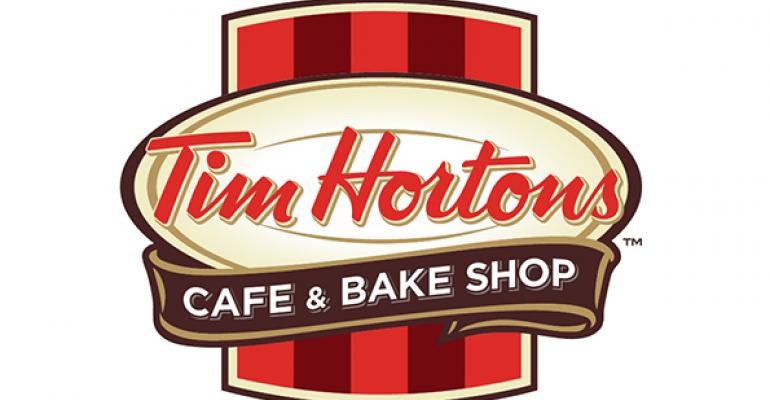Tim Hortons Inc.’s U.S. same-store sales are gaining momentum as it prepares to merge with Burger King.
In what might be its final quarterly report as a standalone company, the Canadian coffee-and-doughnut chain said that its U.S. same-store sales rose 6.8 percent during the third quarter ended Sept. 28, its best performance in the U.S. since early 2012, CEO Marc Caira said during a conference call Wednesday discussing earnings.
In Canada, where Tim Hortons is by far the biggest restaurant chain, the chain’s same-store sales rose 3.5 percent during the quarter.
“It was a very strong quarter,” Caira said. “One of the best quarters in recent memory.”
The results came after Miami-based Burger King Corp. agreed to buy Tim Hortons in an $11 billion merger. That deal is expected to close this year or early next year. Tim Hortons executives, like their Burger King counterparts on Tuesday, would not comment on the deal.
Caira did say the chain would proceed with a strategic plan unveiled eight months ago to create long-term profitable growth and generate above-average returns, even under the new company’s stewardship. While the new Burger King-Tim Hortons merged company will be based in Canada, it will be majority-owned by Burger King owner 3G Capital.
In general, those changes include technology, innovation, narrowing the average check gap with competitors and developing more restaurants. Among its product introductions have been a dark roast coffee that Caira says was the first new coffee blend at the chain in 50 years.
“We have to be bold, daring and different,” Caira said. “We know we can’t win in the new era by doing things the same way we’ve done them. We have to change the way we communicate and share content. We have to evolve the menu to reflect the importance of nutrition, health and wellness. I believe we’re making very good progress.”
Tim Hortons’ revenue grew 10.2 percent during the quarter, to $909.2 million, from $825.4 million the previous year, due largely to its sales momentum. But net income fell 13.8 percent, to $98.1 million, due to the impact of the Burger King deal. Those costs totaled $27.3 million, the company said. Adjusted earnings per share grew 25.2 percent, to 95 cents.
While Tim Hortons is enormously popular in its home country, it is largely a regional brand in the U.S. The company has fewer than 900 U.S. units, compared with 3,800 locations in Canada. Its U.S. locations have half the average unit volumes that its Canadian locations have.
Tim Hortons wants to increase its restaurant count in the U.S. by 300 units by the end of 2018. The company’s strategic plan includes improving average unit volumes in restaurants by adding new and different beverages and meal occasions, and using technology to drive sales and traffic.
The company is also using more traditional franchise development than its typical operator-based model. Tim Hortons said Wednesday it has a deal with a franchisee to build 10 new restaurants in New Jersey over the next five years. With that, the chain now has development agreements for 145 new units over the next five to 10 years in markets like St. Louis; Youngstown, Ohio; Fort Wayne, Ind.; and Fargo, N.D.
These deals differ from Tim Hortons’ typical franchise agreements because the franchisees in this case are spending their own capital to build the new units, much like a typical franchise deal in the U.S.
“We have taken a lot of time to get to know our partners,” Caira said. “This is a long-term relationship. We don’t go into a partnership on a wish.”
But the U.S. market is tough, being the largest quick-service market in the world, and the New Jersey market is heavily populated with Dunkin’ Donuts and Starbucks locations, the two coffee giants in the U.S.
“Show me a market in the world that’s not competitive,” Caira said. “You won’t find too many.”
Contact Jonathan Maze at [email protected].
Follow him on Twitter: @jonathanmaze

